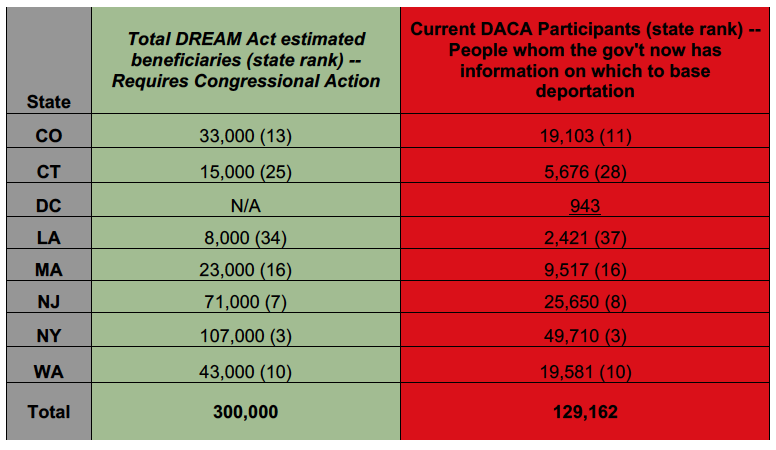by: Janette Martinez
The Trump administration’s announcement to end the Deferred Action for Childhood Arrivals program (DACA) undeniably will harm students of all ages. Approximately 800,000 current DACA recipients’ lives hang in limbo and an additional 400,000 DACA-eligible youth can no longer apply for DACA protection as a result of the Trump-Sessions announcement today. But undocumented students at every stage in their educational career will be impacted starting in K-12 and continuing into higher ed and workforce training programs.
Rescinding DACA is going to hurt K-12 students, because if there’s no guarantee undocumented students can continue their education beyond grade 12, many will see little motivation to do well in secondary school in particular. Already, approximately 40 percent of undocumented students drop out of high school. Nationally, undocumented students make up approximately 2.8 percent of students in grades 6 through 12.
Hundreds of thousands of DACA students participate in higher education, however. In fact, a recent survey of DACA recipients found that 45 percent of DACA recipients are currently in school, and about 72 percent of those are pursuing a bachelor’s degree or higher. Some 30 percent of DACA recipients surveyed in 2016 said they returned to school because of DACA. Those students who depend on DACA have now had the proverbial rug pulled out from under them. For students who have received scholarships because of their DACA status, eligibility will no longer be available once DACA ends.
In short, DACA rescission threatens to prompt a new education dropout crisis in grades K-16 whereby students who often represent the best of America’s hopes suppress their academic ambitions and shirk back into the shadows – under educated and under productive. The human cost cannot be overstated. Without a social security number, driver’s license, or postsecondary degree, DACA rescission essentially creates a caste of workers who for reasons beyond their control are ripe for exploitation and subject to mental anguish that comes from knowing the government has information that they gave in good faith which can now be used against them.
A survey of the initial impact of the DACA program found that just 16 months into the program, 59 percent of respondents found a new job thanks to DACA. DACA recipients with a bachelor’s degree were 1.5 times more likely to obtain new jobs and increase earnings than the DACA recipients without a college degree. All that gain is now gone, unless Congress acts.
Here is a look at the number of DREAMers and current DACA participants in select states.
Source: Migration Policy Institute
But these are just numbers. There are heartbreaking stories behind every one of them. The Trump-Sessions DACA reversal threatens a humanitarian crisis, an education crisis, and a moral crisis. Unbelievably, it’s on the United States Congress now to prevent this snowballing tragedy from worsening.

